Today we travel to a future where all drugs are legal. Just roll up to the store, and get yourself some cocaine!
We start with some history: for centuries a world without drug laws existed. Mark Kleiman, a professor at NYU who studies drug policy, explains that fear of drugs, and the desire to regulate them, really started in the last 1800’s. The rise of industry, advances in chemistry, and the invention of the hypodermic needle all fueled a rise in drug use and in drug fears.
Today, of course, some drugs are legal and others aren’t. Alcohol, tobacco, caffeine and pharmaceuticals are all legal. You probably already know what’s not.
But why are certain drugs legal in the United States and others not? The answer isn’t really science or public health research, but rather historical precedent and racism. Maia Szalavitz, the author of a book called Unbroken Brain: A Revolutionary New Way of Understanding Addiction, walks us through some of the racist campaigns against drugs that linked most of them with “violent” people of color. Take this New York Times story from 1914, headlined ““Negro Cocaine ‘Fiends’ Are a New Southern Menace: Murder and Insanity Increasing Among Lower Class Blacks Because They Have Taken to ‘Sniffing Since Deprived of Whiskey by Prohibition.’” White people said that drug use would make white women sleep with black, asian and latino men. That cocaine made black men impervious to bullets, and make them murder whites at the slightest provocation.
Today, the legacy of those racist ideas is still with us in the form of both drug laws and stereotypes about what a drug user looks like. Which impacts who goes to jail for drugs and who doesn’t.
Here are some statistics: in America, white people and black people are equally likely to use drugs. But black Americans are arrested at twice the rate of white americans for drug crimes. Not only that, but black Americans are more likely to be offered a plea deal that involves prison time than whites are for the same crimes, and are more likely to serve longer sentences than white Americans for the same offense.
Here’s another way to look at it: Black Americans represent 12% of monthly drug users, but comprise 32% of persons arrested for drug possession. And when we’re looking at drug arrests, it’s a huge number of people. Between 1993 and 2011 there were 30 million arrests for drug crimes in the United States, and 24 million of those were for possession of drugs, not selling them.
And while Mark and Maia disagree on a lot of things regarding drug policy, this was one thing they actually agreed on: they both think that possession of small amounts of drugs should be decriminalized.
And I talked to a third person for this episode who agrees. And he’s not someone you’d expect to do so. Officer Tim Johnson, a retired cop. Tim is part of a program called LEAP, Law Enforcement Against Prohibition. He joined as soon as he retired, because despite making a whole lot of drug arrests while he was a cop, he didn’t feel like they were actually making a difference. And there’s data to support that feeling. Studies have shown that while we’ve arrested a whole lot of people for drug possession, the rate of drug abuse hasn’t gone down.
So Mark, Maia and Tim all think that possession should be decriminalized. And some countries have changed their drug laws this way — in 2001, Portugal decriminalized the possession of small amounts of all drugs: weed, cocaine, heroin, all of them. Now let’s be clear that this isn’t the same thing as legalizing drugs. These drugs are still illegal in Portugal but possessing them is not a criminal offense. Which means that if you get caught with drugs you are referred to a treatment program and issued a fine. As long as you’ve got drugs in a small amount, and you’re not selling them, you are not put in jail, and nothing goes on your criminal record. Which is a big deal in terms of scholarships, job opportunities, and all sorts of other stuff.
The results in Portugal have been really positive. Drug use has gone down since 2001, and HIV cases among drug users has also gone down. And Portugal has the second lowest overdose rate in the entire European Union. In Portugal, there are just three drug overdose deaths for every million citizens. Let’s compare that the United States. According to the CDC, in 2014 there were 147 deaths per million in the United States.
So the people who advocate for this future say that if you decriminalize possession you’ll see benefits across the board. And that argument is a sound one, one backed by plenty of public health data and now historical precedent. But beyond decriminalizing possession, everything starts to get really murky. How much should you allow people to have? And how should you regulate sellers? How should we test drugs, and which drugs should we make legal? Does punishment work to prevent people from doing drugs? And how should we handle those who do get addicted? This is where everything gets really confusing.
Later in the episode we tackle these questions, but first we take a detour to sports. What about performance enhancing drugs? Should those be legal too?
To discuss that, I called David Epstein, who’s a reporter at ProPublica and the author of a book called The Sports Gene. David has done a ton of reporting on doping, and he walks us through the three main arguments people make for why doping should be legalized. First, athletes that are doping are really fun to watch. Second, doping stories are a downer and a distraction from the escapism of sports. Third, it’s impossible to catch dopers anyway, so why both.
David doesn’t fully buy any of these arguments and we talk about why in the episode.
One of the things we talk about is whether or not we could split sports into “clean” and “doping” leagues and let players pick which ones they compete in. And in theory that actually exists for bodybuilding.
Here’s the light-weight champion of the World Natural Bodybuilding Federation.
Sung-Min Jo, Light Weight Champion from the 2016 INBF LA!#INBF #WNBF #inbfLA #LA #Korea #KoreanNatural #wnbfworlds pic.twitter.com/eGVbUJxCra
— World Natural Leader (@WNBFofficial) July 4, 2016
And here’s are the finalists from the International Federation of Bodybuilding and Fitness.
Men's #BodyBuilding over 100kg final top 6. #EuropeanChampionships #EBFF #ifbb pic.twitter.com/ofxkBbJY0R
— IFBB OFFICIAL (@IFBB_OFFICIAL) May 6, 2016
After our little detour into sports we come back to what it would be like to have fully, actually legalized drugs. How do you protect consumers? How do you make sure that drug companies don’t just make extremely addictive drugs and turn us all into hopeless addicts? Who should be allowed to sell these drugs, and what kind of training should they have. All that, and more.
We didn’t get to a ton of stuff in this episode too. So here are some links to topics that we discussed or couldn’t touch on.
- Devils, Deals and the DEA — David Epstein
- A Voter’s Guide to Legalizing Marijuana — Mark Kleiman
- The Drug Lord with a Social Mission — Maia Szalavitz
- Can You Get Over an Addiction? — Maia Szalavitz
- Why Legalizing Pot Won’t Curb the Drug War — Keegan Hamilton
- Drug Themes in Science Fiction — Robert Silverberg
Flash Forward is produced by me, Rose Eveleth, and is part of the Boing Boing podcast family. The intro music is by Asura and the outtro music is by Broke for Free. The break music this week is by Fields Ohio. Special thanks this week to Stacy-Marie Ishmael, Tamara Krinsky, Elizabeth McKinstry, Mat Weller, Casey Broughton, Stephen Granade, Kevin Wojtaszek, Navneet Mathur, and Ari Baronofsky. The episode art is by Matt Lubchansky.
If you want to suggest a future we should take on, send us a note on Twitter, Facebook or by email at info@flashforwardpod.com. We love hearing your ideas! And if you think you’ve spotted one of the little references I’ve hidden in the episode, email us there too. If you’re right, I’ll send you something cool.
And if you want to support the show, there are a few ways you can do that too! We have a Patreon page, where you can donate to the show. But if that’s not in the cards for you, you can head to iTunes and leave us a nice review or just tell your friends about us. Those things really do help.
That’s all for this future, come back next week and we’ll travel to a new one.
TRANSCRIPT
Hello patrons! Below you’ll find the transcript for this week’s episode. Hope you enjoy it, and thanks for your support!
▹▹ ▹▹ ▹▹ ▹▹ ▹▹ ▹▹ ▹▹ ▹▹ ▹▹ ▹▹ ▹▹ ▹▹ ▹▹ ▹▹ ▹▹ ▹▹ ▹▹ ▹▹ ▹▹ ▹▹ ▹▹ ▹▹ ▹▹
Rose: Hello and welcome to Flash Forward! I’m Rose and I’m your host. Flash Forward is a podcast about the future! Every episode we take on a specific possible, or not so possible, future scenario and try to really overthink what it would be like. We start with a trip to the future, and then we come back to today and talk to experts about what that future would be like.
Before we go to the future this week I just want to make one super quick announcement and that’s that I’m doing a live show! The first ever Flash Forward live show! It’s going to be super weird and fun and surprising, so if you’re in New York City and you want to come see it and hang out, it’s on August 15th and 8pm in Manhattan. Check out flashforwardpod.com/live for more details.
Okay that’s it, let’s go to the future! Let’s start in the year 2051.
[[Music fades out]]
Advertisement: Tired of spending Sunday mornings in bed, reeling from the fun you had the night before? Want to make the most out of your weekend, without losing hours to a hangover? Kick the beer and wine, drop the mixed drink, and enjoy Goldman’s instead. Our new formula is odorless, tasteless, dissolves instantly in liquid and is among the most lovely highs known to man. Add it to anything, iced tea, water, soda, whatever it is you like to drink, and feel that relaxing buzz without the nasty side effects of alcohol. Goldman’s, party smarter.
[[Phone rings]]
Hello and welcome to the Food and Drug Administration’s automated messaging system. For food inquiries, press one. For drug inquiries, press two.
[2]
To apply for or renew a drug sales license, press one.
To hear about the regulations for drug sales licenses in your state, press two.
To hear the suggested doses and side effects for a drug, press three.
[3]
To hear the suggested doses and side effects for mephedrone press one.
To hear the suggested doses and side effects for 2M2B press two.
To hear the suggested doses and side effects for Bromo Dragonfly press three.
To hear the suggested doses and side effects for O-Desmethyltramadol press four.
To hear the suggested doses and side effects for Methoxetamine press five.
[5]
Mephedrone, also sometimes known as Mexxy, is a chemical analogue of ketamine and PCP, and is classified as a hallucinogen. The FDA suggests that mephedrone be taken through the nose. Side effects include increased heart rate, stomach upset, diarrhea and vomiting. Testing suggests that a safe and effective dose of mephedrone is 10-30 mg taken nasally. Do not exceed 100 mg.
To hear the suggested doses and side effects for a drug, press three.
[hang up]
Advertiser voice: You know, if you were to follow a busy doctor as he makes his daily round of calls, you would find yourself having a mighty busy time keeping up with it. Keeping up for many men of medicine usually requires a bit of extra help. And because they know what a pleasure it is to feel a good, smooth, even pick me up, they’re particular about the brand of pick me ups they choose. In a repeated national survey, doctors in all branches of medicine, doctors in all parts of the country were asked “what do you use, doctor?” Once again the brand named most was Bayer. Yes, according to this repeated nationwide survey more doctors use Bayer’s Can- D than any other pick me up. Why not change to Can- D in the next 30 days and see what a difference it makes in your productivity and enjoyment. See what you can do, with Can- D.
[[Music fades out]]
Rose: Okay so today’s future is one in which all drugs are legal.
Now, today’s episode is another one where I’m going to focus on the United States drug policy, just because it’s really hard to talk about the entire world’s drug perceptions and laws. So, sorry international listeners! We will talk about some non-US examples too! But mostly we’ll be talking about America.
So, let’s start this future in the past. Because a world of legal drugs has existed, right? Drug laws are not as old as the universe, or even as old as drugs.
Mark Kleiman: As far as I can tell before 1850, there were no drug laws in the world.
Rose: That’s Mark Kleiman, a professor of public policy at NYU who studies criminal justice and drug policy.
Mark: But the notion that drugs are something that need to be dealt with by policy is relatively new.
Rose: Over time, the world got more industrialized,
Mark: If a farmer drunk all the time it doesn’t matter all that much. If an industrial workers is drunk all the time it’s probably not so good.
Rose: And more drugs became available to more people,
Mark: In the middle of the century you get two important revolutions. One is on the analytical chemistry side: the isolation of the pure active agents morphine and cocaine from opium and coca. And on the drug delivery side of the invention of the hypodermic syringe.
Rose: That was when people started looking at drugs as problems, public health problems, cultural problems, problems that needed to be addressed by laws.
So we started banning drugs. But not all drugs. So let’s talk about what’s illegal today in the United States, and what’s not.
Let’s start with the legal stuff: alcohol is legal, tobacco is legal, caffeine is legal. Pharmaceuticals are legal as long as you have a prescription. And in some states, marijuana is legal, although in the US cannabis is still illegal federally so it’s a bit weird.
In most states though, marijuana is illegal. As is cocaine, heroin, methamphetamine and a whole bunch of other drugs.
Now, you might think that the decisions about which of these drugs were legal and which of them aren’t would be based on public health research — that there is a sound, scientific case to say that say, alcohol is less harmful than weed, hence the laws that allow alcohol and prohibit weed. You might think that! You’d be wrong though. Because drug policies in the United States mostly aren’t based on science. They’re based on historical accidents, and racism. A lot of racism.
Maia Szalavitz: If you look at the campaigns behind the illegalization of the currently illegal drugs every single one of them is fundamentally racist.
Rose: That’s Maia Szalavitz, she’s a journalist who covers drugs and drug policy, and the author of a recent book called Unbroken Brain: A Revolutionary New Way of Understanding Addiction. Her book is part memoir from her own days of addiction, and part science book going through all the research on drugs and addiction from the past 25 years. We’ll get to that stuff in a second, but first, back to the racism.
Maia: Cocaine is illegal because it would make black men impervious to bullets supposedly. Heroin is illegal because — well it was originally opium that was made illegal — because it would make Chinese men seduce white women. That was also believed to be an issue with cocaine and black men. Marijuana is illegal because it would make white women sleep with Mexicans and so-called entertainers. If you look in the archives of The New York Times and the other newspapers of the times you will find things like “Negro cocaine fiends are a new Southern menace” which is an actual headline from The New York Times the year before so-called narcotics became illegal. And so this the system of regulation and prohibition that we have is not based on protecting people. If it was based on protecting people it would not be the system that we have.
Rose: In 2010, the Lancet did a study comparing the harms of 20 different drugs. They looked at how each one harmed the individual and how they harmed others. And they found that overall, when you look at both individual harm and outward harm, the most dangerous drug wasn’t meth, or cocaine, or even weed. It was alcohol. Other studies have ranked alcohol in the top five most harmful drugs used by people, often next to things like heroin and crack.
So we have a system in which American drug laws don’t necessarily reflect the harms that those drugs can do to a person. And it’s also worth taking a moment to point out that the impacts of these drug laws are not minor, and they’re not fair either. Far more people of color spend time in jail for drug offenses than white people, even though studies show over and over that drug use is directly proportional to population. So white people are just as likely to use drugs as anybody else, but they’re far less likely to go to prison for it.
Here are some statistics: in America, white people and black people are equally likely to use drugs. But black Americans are arrested at twice the rate of white americans for drug crimes. Not only that, but black Americans are more likely to be offered a plea deal that involves prison time than whites are for the same crimes, and are more likely to serve longer sentences than white Americans for the same offense.
Here’s another way to look at it: Black Americans represent 12% of monthly drug users, but comprise 32% of persons arrested for drug possession. And when we’re looking at drug arrests, it’s a huge number of people. Between 1993 and 2011 there were 30 million arrests for drug crimes in the United States, and 24 million of those were for possession of drugs, not selling them.
And here is where everybody I talked to actually agrees on something about this future. We’re going to get to all the ways they disagree in a second, but they all agreed on this one thing:
Mark: All laws against possession of all drugs should be repealed. We should stop punishing people for having drugs.
Maia: The most obvious thing to do is decriminalize possession of everything. Nobody should be put in a cage for possession of a substance that just it doesn’t help them it doesn’t deter anybody else. And we’ve tried that for a hundred years it does not work.
Rose: And it’s not just Mark and Maia who think this, I also found a guy who might be one of the last people you’d expect to be for this particular future.
Officer Tim Johnson: Hello this is Tim
Rose: Hi this is Rose
Tim: Hi Rose how are you?
Rose: I’m good how are you.
Tim: I’m good trying to get some boating in today.
Rose: Oh are you on a boat right now?
Tim: No, sitting here waiting when I get done with you I’ll go get out there.
Tim: Again my name is Tim Johnson I’m retired law enforcement from the central Ohio area with 20 years of experience as a senior patrol officer I retired the entire 20 years on the roadway working with the communities inside and out. I have worked various assignments from all Patrol aspects to the federal, local drug task force units all sorts of sizes and shapes so to say, I’m a certified negotiator in the field training officer. Community Oriented Policing expert a crime prevention expert by patrol to train the trainer. So I’ve done a whole realm of as far as you know in the 20 years I was kind of done the whole realm of done investigation but done undercover. You know the traffic patrol all the duties in details that go with that. So everything on pretty much I’ve been involved in.
Rose: So Tim is a former cop, a former cop who has arrested a lot of people for drug violations. One of his first arrests ever, actually, was a 19 year old, sitting on a bench, smoking a joint.
Tim: The 19 year old did go to court. He did get charged with a criminal conviction as a result of that he lost his license for six months as a result of that he also lost his school loans grants school grants that he was getting he was in a second year of a two year program. And then he lost his part time job that he had as a result of that.
Rose: Tim is retired now, and he’s a member of a group called Law Enforcement Against Prohibition, which is an organization made up of former law enforcement employees who question just how effective drug prohibition really is. Now, nearly everybody in LEAP is a *former* law enforcement employee because you can’t actually be associated with LEAP if you’re a cop, they’ll take away your license. But once he retired, Tim joined LEAP pretty quickly. He says that he just isn’t convinced that arresting people for possession is working.
Tim: My personal opinion is it’s been eighty years that it’s been going on and we haven’t done anything we haven’t certainly and I think on winning the war on drugs of it’s definitely we’re losing it. We’re putting more money in the hands of cartels and gangs. By the way that we operate by the way that we work the programs. So there’s a definite trail here that what we’re doing isn’t working. If we were in any kind of a military conflict for this long. Somewhere along the line somebody would have made a decision. We could get out.
Rose: And there is data to support this, studies have shown that while we’ve arrested a lot of people for possession, the actual amount of drug abuse in the United States has not gone down.
So let’s go to the future. And let’s start with a future that’s halfway between here, and the one we saw at the beginning. A future where drugs aren’t entirely legal, but possession is decriminalized.
Now, some countries have changed their drug laws this way — in 2001, Portugal decriminalized the possession of small amounts of all drugs: weed, cocaine, heroin, all of them. Now let’s be clear that this isn’t the same thing as legalizing drugs. These drugs are still illegal in Portugal but possessing them is not a criminal offense. Which means that if you get caught with drugs you are referred to a treatment program and issued a fine. As long as you’ve got drugs in a small amount, and you’re not selling them, you are not put in jail, and nothing goes on your criminal record. Which is a big deal in terms of scholarships, job opportunities, and all sorts of other stuff.
The results in Portugal have been really positive. Drug use has gone down since 2001, and HIV cases among drug users has also gone down. And Portugal has the second lowest overdose rate in the entire European Union. In Portugal, there are just three drug overdose deaths for every million citizens. Let’s compare that the United States. According to the CDC, in 2014 there were 147 deaths per million in the United States.
So the people who advocate for this future say that if you decriminalize possession you’ll see benefits across the board. And that argument is a sound one, one backed by plenty of public health data and now historical precedent. But beyond decriminalizing possession, everything starts to get really murky. How much should you allow people to have? And how shoudl you regulate sellers? How should we test drugs, and which drugs should we make legal? Does punishment work to prevent people from doing drugs? And how should we handle those who do get addicted? This is where my guests part ways. And we’re going to get to all that stuff, and a world with completely legal drugs, when we get back. But first, a quick break.
[[AD BREAK]]
Rose: Okay, so so far in this episode we’ve mostly been talking about illicit drugs used to get high — weed, cocaine, heroin, that stuff. But there’s another branch to the legalizing drugs question that I want to go down really quickly. And that’s performance enhancing drugs for sports.
Now today it seems like there’s a doping scandal every week. But the idea that taking drugs to enhance your performance is somehow cheating is actually kind of new.
David Epstein: The guy who won the Olympic marathon in 1900 for example was drinking a combination of brandy and strychnine because it was thought he performs an answer so like after winning the marathon he was found like passed out in the gutter basically. And and you know people didn’t it wasn’t a scandal that he was using that.
Rose: That’s David Epstein, a reporter at Propublica and the author of a book called The Sports Gene. And he says that this idea that using drugs is cheating, and is morally wrong in sports, started to really pop up during the Cold War
David: Russians started using testosterone harvested from animals for weightlifters and then an American doctor who noticed this made the first synthesis of synthetic testosterone. And so I think in some ways it grew out of this sort of Cold War you know battle on the sports field kind of thing between Russia and the United States this sort of proliferation of performance enhancing drugs and then you know that led to people going to such extremes that sometimes people died. And so I think it really grew sort of out of some Cold War rivalry.
Rose: Today we see doping scandals all the time. Maria Sharapova was recently banned from tennis for two years for taking a drug called meldonium. Lance Armstrong was banned from cycling for life after his doping was revealed to the public. Russian athletes were barred from the Rio Olympics after a widespread doping ring was uncovered.
And some people think that all these players being banned, these constant news stories, it’s all useless and unnecessary. That we should just legalize performance enhancing drugs and let everybody just play. And there are three main arguments here.
The first is that people like to watch athletes that are doping. Because athletes that are doping can do incredible things.
David: As athletes become less and less like normal people anyway there’s this idea that like well let’s just see the maximum that we can push the body too. There’s a professor in Scotland named Andy Maya who argues that this pharmaceutical part of sports is just an expression of human creativity the same way sort of you know building cars and car racing is and we should just embrace that. And like if we want to transplant cheetah tendons onto a person like let’s see what we can do because we’re going that direction anyway.
Rose: The second argument is kind of related to this one, and that’s that all these banns and doping scandals are a downer, and they make sports less fun to watch.
David: People who just think they’re reporting on it is a downer and they want to see sport sort of as an escapism and they don’t like the negative news.
Rose: And the third argument is that catching dopers is really really hard. And even though we hear about doping scandals all the time, most dopers don’t actually get caught.
Take for example one of the main tests that they use for doping, it’s called the T E ratio test and it basically tests for two hormones: testosterone and epitestosterone. Humans naturally have both of these things, but when you’re doping, the ratio between them changes. Without doping, they’re usually present in equal amount. With doping, epitestosterone says the same but testosterone jumps up, so the ratio changes. So all you have to do is test for this ratio, and you can catch dopers right? Well, it’s not quite that simple.
David: To have your test flagged you have to go above four to one. So first of all there’s a lot of natural variation but you have room to dope between one to one and four to one called micro dosing. Basically using small doses of a drug that are hard to detect before you even trigger that test. Secondly some people just have a genetic profile that alters the way that they excrete testosterone such that their T/E ratio stays the same even when they take testosterone or analogs to testosterone which are steroids and so the only people you’re probably likely to catch are the ones who happen to have this physiological response with their T/E ratios zooms up and stays up for a while after you certain drugs. So there’s a because you don’t want to catch unfairly catch innocent athletes. And in order to reach that level it has to be so abnormal that if you dope pretty intelligently you can be abnormal but not abnormal enough that you’re going to trigger a positive test. So if you’re smart about it you can kind of stay within the limits that will trigger a sanction.
Rose: So, this third argument goes, you’re just never going to catch everybody, so why bother?
David: I think part of the part of the thought is that the sort of cat and mouse game of scandals is just a distraction from the people things that people like about sports and we know that no matter how good testing gets a huge number of people who are cheating are going to slip through. So kind of why even do it.
Rose: But the idea that letting everybody dope will level the playing field is actually not quite right, David says.
David: There’s plenty of evidence now that teams are recruiting people who would respond to certain doping drugs better than others. There’s some called the hematocrit just for an example. I t’s your proportion of the your bloodstream is made up of red blood cells which carry oxygen so higher is better. But if you go above 50 they wouldn’t let you start a race in cycling. And so the teams would go look for someone who they would say OK this guy’s a really great cyclist but he’s at 48 hematocrit already this other guy is only at 40 and he’s only pretty good. But we can dope him like crazy. He’s got tons of room to go.
Rose: So legalizing doping wouldn’t necessarily just mean that everybody has the same chances. And, it’s not without harm. Some of these drugs can have lasting negative impacts on players health. Or, they’re being given to athletes with promises they can’t keep. And when you talk about doping you’re not just talking about professional adult athletes, you’re talking about kids too.
David: People think that the the the market for performance enhancing drugs is like pro athletes I’ve spent a lot of time with steroids dealers and there are not enough pro athletes to sustain that market it’s mainly people who want to look better or feel tougher or bigger or whatever it is and you know. Teenagers especially teenage boys have plenty of changes in testosterone going on already. They don’t they should be supplementing it.
Rose: If doping is legal, then it’s likely that you simply won’t be able to compete without doing it. Which is slowly becoming true, but there are still athletes out there who don’t do it. And they’re often the ones arguing the most against legalizing these drugs. Take Alyssa Montano, an American 400 and 800 runner. In the 2012 London Olympics, she came in 5th in the 800 race, behind two Russian women who she knew, even then, were doping. It wasn’t until late last year, when those runners were finally caught, that she could talk publicly about it. She’s been vocal about her feeling, and how she doesn’t want to have to play the doping game to be able to keep up and compete.
If we did legalize all performance enhancing drugs, what do these athletes who don’t want to take those risks do? Maybe they create their own leagues, maybe there’s a clean Tour de France and a doping Tour de France. A clean Major League Baseball and a doping one.
David: Yeah I mean there’s you know they have that in bodybuilding there’s like clean divisions where I think people are still doping but doping less hitter they have like the normal one and the clean one separately.
Rose: Can you tell the difference between the two.
David: Oh yeah absolutely.
Rose: Interesting.
Rose: So I looked up images of bodybuilders, and the “natural” bodybuilders vs the other leagues and you really can tell. I’ll post pictures online.
So we could just split sports into leagues that do and don’t allow doping. But here’s my question: we might talk a big game about wanting PURE athleticism. About cheating and doping and wanting to see what the human body can really do without steroids or artificial help. But do we really? If we let the market decide and have people vote with their dollars and viewership between an NFL where everybody is clean, and an NFL where everybody is doping, are people really going to chose the clean league?
And in the end, a lot of it comes down to what you think the point of sports are.
David: When I was reporting on doping I read a lot of philosophers to try to figure out what sport was about and this one I love named Bernard suits tried to summarize sports and games in one sentence and he called it voluntary acceptance of unnecessary obstacles**.
Rose: The voluntary acceptance of unnecessary obstacles. So the question is: are those those anti-doping rules part of the unnecessary obstacles that athletes voluntarily accept? Or not?
Now, I think one of the reasons I wanted to include this kind of, diversion, into sports and doping in this episode about legalized drugs, is because in a lot of ways sports can kind of help us have conversations about health and ethics that are really hard to have when it comes to drugs like heroin or cocaine. But we can sort of use sports to guide us in these conversations without getting stuck in the “drug abusers are evil” or “drug abusers are just sick” debate.
So in sports we can say things like “let’s just legalize them all, and try to regulate to keep people safe and healthy.” But that argument is extremely radical when it comes to other drugs.
Now, to be fair, steroids and performance enhancing drugs aren’t as dangerous or addictive as other recreational drugs like heroin or opioids. But if we can talk about regulating an open market of steroids, why can’t we talk about regulating an open market of heroin?
Let’s try. Let’s go to this world of totally legal drugs. What happens?
Mark: A Lot more people who would find themselves in the grip of substance abuse problems.
Rose: So if we simply let everybody loose to do whatever drugs they want whenever they want, that’s, probably not a good idea? I mean some die hard libertarians are all for this. They think that everybody has the personal right to destroy themselves if they so choose. But I think most people in general are in favor of regulating things that cause death and destruction. Except guns, I guess, but that’s a topic for a different future.
So assuming we don’t want to just let everybody do heroin willy nilly, how do we legalize drugs without complete chaos and death?
Maia: So what I think is the answer to that is you are never going to have no harm. You want to make the policy that minimizes harm. People are going to get their hands on things. We can either make it easier or harder.
Rose: The first step in our post-drug-law world is probably research. Research into what works and what doesn’t, what safe doses are and what they aren’t, and what the best drugs are really.
Maia: We need to empirically test the best levels of regulation for various things in. But that certainly doesn’t mean that like insanely dangerous drugs that you know the lethal doses like you know one milligram away from the effective dose should be legal but nobody would want those drugs if they had better alternatives. The future of drugs is really better drugs.
Rose: And along with that testing, some people would like to see some training for the folks selling these drugs. So that it’s not about selling the most at the highest profit, but actually taking care of the customer’s needs and health.
Mark: I would certainly require the people doing the actual retail selling to have both training in helping people manage their habits. And a professional responsibility to serve the interest the consumer and not the interest of the boss.
Rose: So in the ideal version of this future, you can go into a licensed store, speak with a professional who understand the pharmacology, who knows what they’re selling you and who can guide you in your purchasing.
Maia: Because really people should not be getting in trouble in relation to dos something that they know the actual dose.
Rose: Now some marijuana dispensaries have people with this kind of expertise, but not all of them. These places could also take a page out of gambling’s playbook, by letting people pick a pre-set limit for themselves before they start buying, and cut themselves off when they feel they might be losing control.
Mark: You know if you’re going to be going to go the casinos you have to establish your personal loss limit and the casinos are required to enforce that. Now that seems to me to be a policy that’s pretty respectful of personal liberties. I could set an infinite target if I wanted it, but my guess is that most people when asked “well how much pot you want to smoke every month?” would give a finite number not an infinite number. And then if they said that is a quota and that would be enforceable. It would interfere with their behavior only if their behavior was behavior that they had said in advance that they didn’t want to engage in. That doesn’t strike me as as an assault on liberty.
Rose: But there’s another way that this legal-high future could get very dark, very quickly. And that is thanks to our old friend, or maybe foe, capitalism.
Maia: Where it becomes a complicated problem is because of the hyper capitalism that we have at the moment because you really kind of don’t want Philip Morris crack like that would really be a bad idea.
Mark: Just imagine you know somebody who works for McDonald’s or Nabisco in the lab. And you say look all the drugs in the world are legal including the one you’re just about to invent, and your job is to sell as much as you can. Imagine the solution to that guy’s problem and you could imagine the world.
Rose: So just like there is an FDA to make sure that pharmaceutical drugs aren’t extremely dangerous, there would need to be a way to keep drug manufacturers from making drugs that are poisonous or SUPER addictive.
And in fact, the idea of an FDA for recreational drugs has been attempted, in New Zealand in 2013.
Maia: So basically they had, New Zealand had a lot of legal highs being sold there in part because it’s like a very isolated country and you know as somebody put it “the cocaine boat doesn’t stop here.” Lots of you know there was a big market for this and there was this like crazy rock n roll guy
Rose: His name is Matt Bowden
Maia: Who was really into drugs and he decided that his friends and himself were having too many problems with amphetamines. Let’s see if we can make something that is less harmful. And he looked through the pharmaceutical literature and found a failed antidepressant called BZP and started selling SOW’s of them. And this was because there it was not illegal
Rose: So he orders these drugs from labs in India and China, and he starts selling them. But so do other people. And those other people were less careful about how potent their drugs were. And so Matt Bowden decided there had to be a better way.
Maia: He managed to weave the support of the industry and his own work in industry get through Parliament a law that was basically going to create a process for legally testing these things. And then you know allowing the companies to do essentially clinical trials and they didn’t have to be effective. I think the coverage and care of stuff actually got you higher not just how to be safe. So you didn’t have to do clinical trials like looking for like how high does this get you. Obviously the industry would prefer that it does actually get you somewhat high because just a placebo is not going to sell all that well in the long run. But they came up with these scales related harmfulness And you know how addictive is it and you know how what does it does it damage your organs like can it cause overdose these kinds of things. And so they created this whole regulatory system and they created local stories that were going to sell you know licensing for local stores in this whole big deal.
Rose: So Matt Bowden, noted drug dealer, managed to get this law passed that created the world’s first set of regulations for clinical testing and approval of recreational drugs. Which is, kind of incredible.
But, then things kind of fell apart.
Maia: Then a new government came in, a new party came in, and they just went the opposite direction.
Rose: The law was passed in 2013, but in 2014 New Zealand passed a revision to this law. And that revision banned all of the substances that were on sale, and it also prohibited the use of animal testing in New Zealand for trials for new ones. Which basically totally blew up this whole FDA for recreational drugs idea.
Maia: And this is like sort of characteristic of New Zealand policies where it’s a small country and it sort of swings. You know you can have these swings back and forth like this and actually it’s characteristic of drug policy more generally where. It does tend to swing from one extreme to the other.
Rose: And Matt, the guy who had spearheaded this whole thing, couldn’t afford to do clinical trials and animal testing overseas,
Maia: The guy Matt Bowden who was in the industry basically got bankrupted by the collapse of this so nobody has the money to put anything through clinical trials and the illegal people don’t have the inclination.
Rose: So, the FDA for drugs in New Zealand never happened. And there’s been nothing like it since. But if we were in this future of legalized drugs, we’d probably want something like that to protect consumers.
Maia: And so I mean I think you know so these questions will really have to do with the individual drug. You know I really don’t think like you know Wal-Mart should be selling opiates over-the-counter. But you know I should be able to go to a clinic and get opioids for mental reasons as well as physical ones. You know these are all issues that we just haven’t grappled with as a society we haven’t thought rationally about.
Rose: So perhaps the question about the future isn’t, will we have totally legal drugs, but rather, will we have a calm and rational discussion of drug policy in general. Is that possible? I don’t know.
Tim: Remember you can reach us at cops say legalize drugs.com!
Rose: So there’s a lot we didn’t talk about in this episode, stuff like the prescription drug epidemic and the ways that legal drugs might change the drug related violence going on in places like Mexico and Venezuela. If you go to flashforwardpod.com I’m going to post some good links to stuff that touches on those questions.
Flash Forward is produced by me, Rose Eveleth, and is part of the Boing Boing podcast family. The intro music is by Asura and the outtro music is by Broke for Free. The break music this week is by Fields Ohio. Special thanks this week to Stacy-Marie Ishmael, Tamara Krinsky, Elizabeth McKinstry, Mat Weller, Casey Broughton, Stephen Granade, Kevin Wojtaszek, Navneet Mathur, and Ari Baronofsky. The episode art is by Matt Lubchansky.
If you want to suggest a future I should take on, send us a note on Twitter, Facebook or by email at info@flashforwardpod.com. I love hearing your ideas! And if you think you’ve spotted one of the little references I’ve hidden in the episode, email us there too. If you’re right, I’ll send you something cool.
And if you want to support the show, there are a few ways you can do that too! You can go to flashforwardpod.com/donate to learn about all the ways you can give to the show, including one time or recurring dontaions. But if that’s not in the cards for you, you can head to iTunes and leave us a nice review or just tell your friends about us. Those things really do help.
That’s all for this future, come back next time and we’ll travel to a new one.

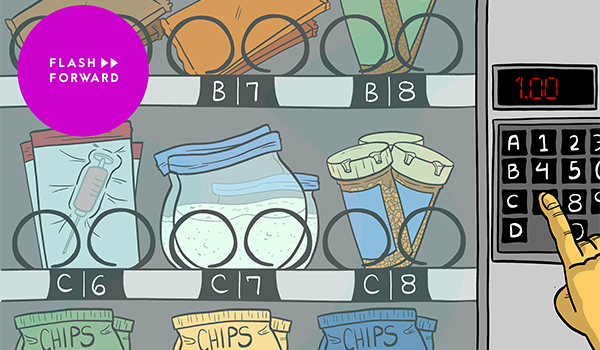
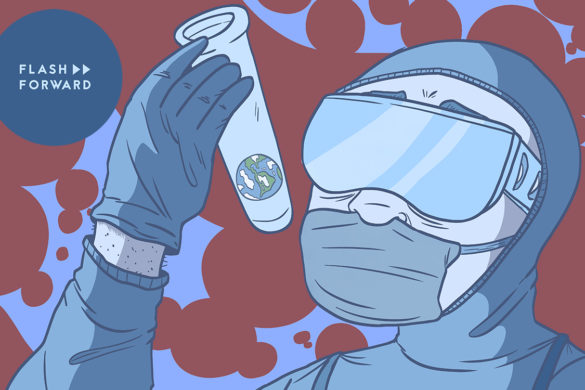
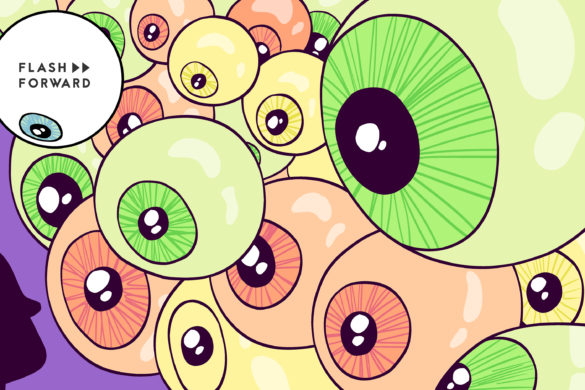
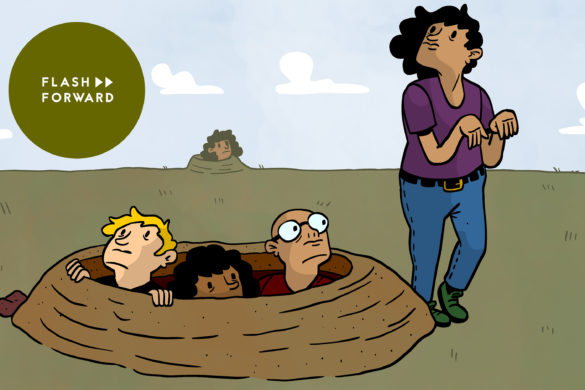
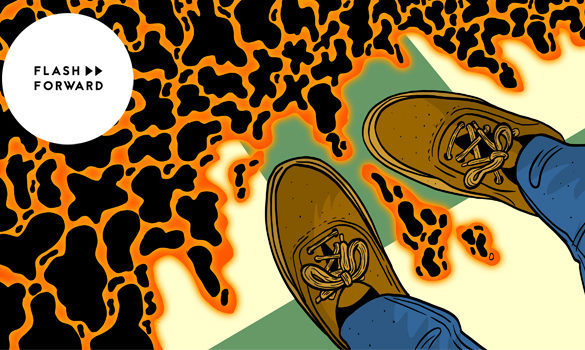
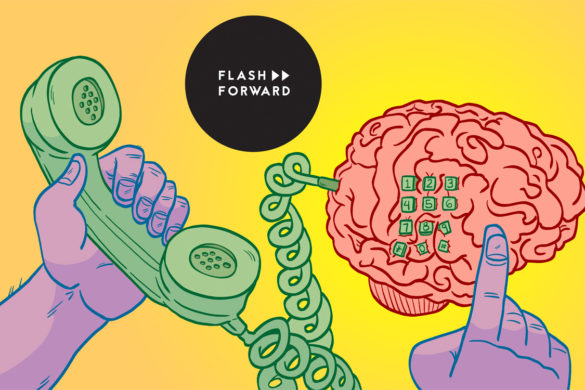
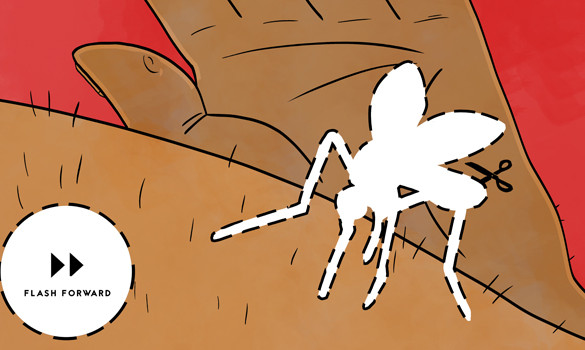
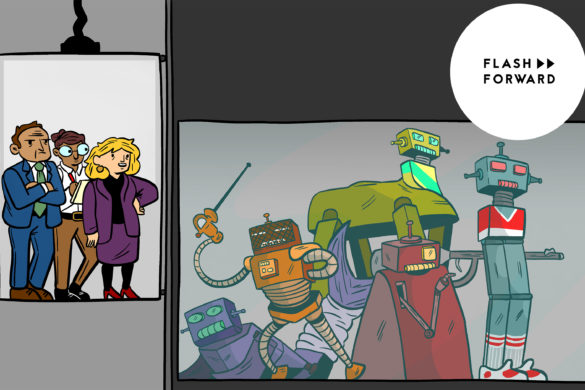
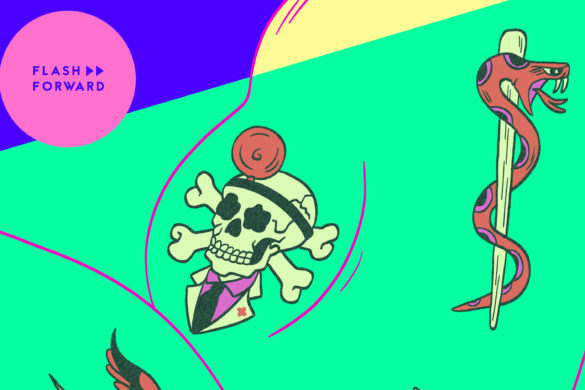
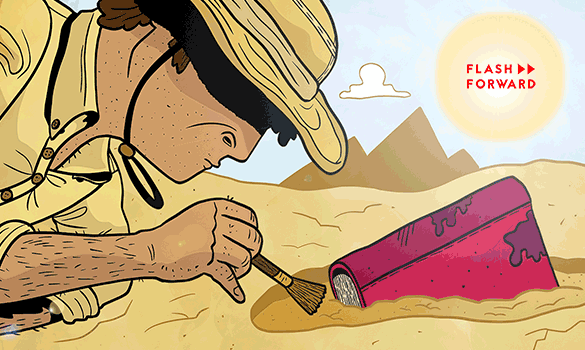
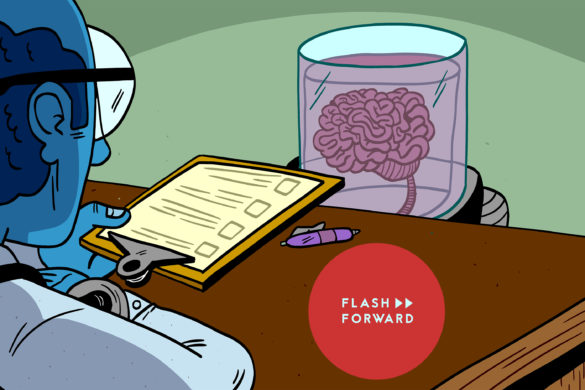
21 comments
[…] https://www.flashforwardpod.com/2016/07/12/episode-17-the-altered-state/ […]
I think my biggest concern about the steroid argument is the kids. I don’t care about professionals. I think it makes the sport less interesting, but they’re highly paid adults, consciously choosing on whether or not they want to participate, so — whatever. But we already have a problem for kids where it’s harder and harder for kids to get into sports if they haven’t been in them since before they were in school and if they don’t spend the entire off-season (if there is one, soccer is pretty much year-round these days) training hard for the sport at camps and at gyms and with personal trainers. There’s already very little room for recreation or health or fun, which to my reckoning is what pre high school sport should be about.
Or just think about it sheerly in terms of economy — pre-college age kids spend multiple hours per day, 5-7 days per week, for 18 years (at the possible expense of school work, or working for money, or social lives) training for something that maybe 5% of them will qualify to participate in at the college level. The rest get nothing for their efforts. That 5% go four more years, and only 5% of them will be in the running for professional level play after that. The rest get nothing.
Now add performance-enhancing to that mix. They’ll be pushing harder, wearing out their bodies more and faster, all the while making huge profits for their schools & pre-pro sport organizations while reaping none for themselves — all for the privilege of becoming used care sales folk with CTE, pronounced limps or permanent tennis elbow. Oh, and they get to die 10-20 years younger than they should and have secondary sex characteristics atypical to the natural sex of their bodies. Because some selfish adult told them to dope or they couldn’t play with their friends.
Hi Mat!
Yeah David talks about that in the episode, that steroids aren’t just used by adults who know what they’re doing and are taking calculated risks. Kids have no clue what they’re doing!
We also talk about some of this stuff in the episode on head injury from season one: https://soundcloud.com/flashforwardpod/the-most-dangerous-games
Just a point about the comment, by Mark Clemin, made early on in the episode. I’m surprised he didn’t find laws restricting drug usage prior to 1850 in the world (says specifically “the world”). Off the top of my head- the first Opium war, Islamic jurisprudence, the Ottoman’s with coffee (albeit short-lived). I could be wrong about those three things, but I’m pretty sure legislation that is supposed to limit the consumption/possession/sale/etc. of certain drugs or drug like substances was a thing for quite some time prior to the 1850’s. Although I’d imagine that the modern type of legislation which is still with us, in some form, would’ve been right after the 1850’s. Anyways, just a minor point. Love your podcast Rose and keep it up.
P.s. I love the opening music(?) (Idk what to call it), I was really hoping it was a sample of a larger piece, but sadly it doesn’t’ seem to be. Presumably you selected it because you liked it, and it felt appropriate, got any recommendations for similar pieces of sound?
EDIT: For some odd reason I never came across the Asura page on FMA before. Found “Whispering Through”. Sorry about that, brain fart.
I didn’t know that most drugs that are not legal is because racism! That is so not cool.
Thanks for the great show. I would like to point out one thing.
In discussing drugs for athletic enhancement, I feel like you muddled the distinction between a drug being legal and being allowed by a sports organization. I think that these drugs should be legal because making them illegal causes more problems than it solves. But I don’t think that sports organizations should allow their use. I don’t really care about the “spirit of the game” thing, but I think it is unethical to encourage people to harm themselves or to punish people for refusing to harm themselves.
That’s fair, although if you allow for the opposite of what you’re talking about: all performance enhancing drugs in sports are okay, that puts some athletes who do want to dope in a weird position, since some of these drugs are illegal in their home countries.
[…] Flash Forward: The Altered State (7/12/16): Host Rose Eveleth draws up a future where all drugs are legal, and discusses what some of the implications would be by looking to the past first. The show also delves into performance enhancing drugs which is fascinating. (36 minutes) Twitter: @ffwdpod […]
[…] ▹▹ Full records show […]
[…] ▹▹ Full show notes […]
[…] ▹▹ Full show notes […]
[…] ▹▹ Full show notes […]
Hey Rose,
I love the show, thank you for the good job 😉
When I was listening this podcast I remembered a not so good sci-fi movie that describe a world where all the drugs are legalize ( http://www.imdb.com/title/tt1957938/). The movie is a bit crazy ( there is time travel at some point) but there is some things that you point out that are there. I think it is interesting to watch.
Also, the documentary about the deep web drug market (http://www.imdb.com/title/tt3312868/) there is interesting points about the discussion on how the people that are selling drugs can be more careful with the clients with an open market.
best regards!
[…] ▹▹ Full show notes […]
It’s a no-brainer..if alcohol, xanax and stronger benzodiazipines, ritalin and other (meth and other) amphetamines, nicotine, various opiates, and so on are going to be legal (and why shouldn’t they?) then it all should be legal….cocaine and opium, in fact, are mild compared say mixing xanax and vodka (which can and does kill many people)…by some accounts opiates can preserve the body, and obviously coca has been used forever, and used to be in Cola-Cola! Drug laws are political in nature, and also economic….if, say, Xanax was made illegal it would hurt the pharmaceutical companies that have paid off so many congressman and so on… Psychedelics have been made illegal for other reasons, too….if everyone dropped acid all the time the world would be a very, very different place…….
Hi Rose
I’ve been enjoying this podcast. This one in particular, felt like it had so much potential that wasn’t realised (not because of you, just because it’s such a massive subject).
Some context for the New Zealand recreational drug laws. The Government didn’t change in that time, nor did its policy direction. What happened was that current drugs were given ‘interim approvals’ until testing was carried out, health statistics about recreational-drug related harm skyrocketed, there was a lot of public outcry, and so it became clear the interim approvals weren’t a safe part of the regime and stringent testing should be carried out before anything was available. The testing regime otherwise would have remained unchanged, except that the left wing parties fought hard to include animal testing bans in NZ (which was not part of the Government policy), which made it practically much more difficult to get drugs approved. In American terms, this is like the Republicans passing laws allowing recreational drugs to be used, and Bernie Sanders crashing the party and stopping it, which might seem inherently odd to an American perspective. In any event, the regime still stands, and it is likely that legal highs will end up back in NZ at a later stage under the regime. It’s odd hearing that things went in ‘a different direction’ because living here that is not what it seemed like at all.
Having said that, it created a very interesting public debate about the tension between the need to test drugs to ensure they are safe, and the inability to actually test them. How can you possibly call a drug safe to humans if you can’t test it? The moral question of animal testing is just one very interesting angle this podcast wasn’t able to take, and it’s an interesting question to be asking even if you limit it to the current pharmaceutical industry.
The other thing I think is very interesting and I wish it could have been explored more is whether or not morality would play a role in whether or not people were more likely to watch doped sports or clean sports. Ultimately, if there is a lot more money in doped sports, it actually means there is no real choice for athletes, and if the drugs do the athletes harm, then aren’t we as a society creating a form of institutional harm to a set of people? It seems to me that if sports ever accept doping is a thing that should happen, then we are actually passively sanctioning (often) state-imposed harm, and that is the root cause of a lot of today’s bans.
Another angle I was interested in is the amount of public health spending that goes into minimising alcohol and cigarette harm, and how that compares to the money spent on policing illegal substances.
Yet another is whether or not the American term ‘the war on drugs’ is actually helpful at all. I think in some ways this terminology (which has found its way to New Zealand as well) is very misleading, because it doesn’t seem to resemble a military conflict at all. Would we talk about a war on murder or assault? It’s an interesting term that holds a lot of connotations and I wonder why it is so popular.
Anyway, I guess the number of things I felt were still left to talk about and the fact I’m commenting here is a sign of asking the right questions and a job well done!
On another note, you’ve done a lot of bot-based pods this year, but one I’d find interesting is how much bots might threaten white collar jobs eg lawyers, I think there is a very diverse range of views out there and it’s one I’d love to hear.
I think there are lots of folks out there who would be fine with legalizing all plants, vs. legalizing all drugs. There is a difference. It is really the extracted and purified forms of say cocaine or heroin that are most addictive and harmful vs. the plants that these drugs are refined from. The average small scale pot grower isn’t causing much, if any, harm to the community.
[…] recs: Micro But Mighty, The Altered State, Bye Bye […]
This is one of the best podcasts episodes I’ve ever experienced. It seems we are all trapped with the legal status quo. Law was invented before science, or the notion that rules should be continuously updated to reflect new knowledge. The current legal paradigm seems to come from a notion that rules are universal and meant to last forever. But we’ve known for a hundred years now that even the laws of physics can flawed and need of maintenance. Yet we have no viable recourse to challenge or peer review our social laws. Sad really. We think of ourselves as so modern. This quagmire harkens back to the pharaohs.
over at this website Series en Streaming HD